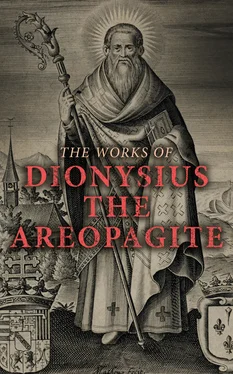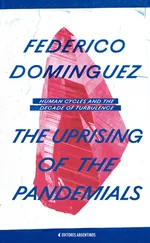SECTION XV.
Extract from the “Hymns of Love” by the most holy Hierotheus:—
Love, whether we speak of Divine, or Angelic, or intelligent, or psychical, or physical, let us regard as a certain unifying and combining power, moving the superior to forethought for the inferior, and the equals to a mutual fellowship, and lastly, the inferior to respect towards the higher and superior.
SECTION XVI.
Of the same, from the same Erotic Hymns.
Since we have arranged the many loves from the one, by telling, in due order, what are the kinds of knowledge and powers of the mundane and supermundane loves; over which, according to the defined purpose of the discourse, the orders and ranks of the mental and intelligible loves preside; next after 38which are placed the self-existent intelligible and divine, over the really beautiful loves there which have been appropriately celebrated by us; now, on the other hand, by restoring all back to the One and enfolded Love, and Father of them all, let us collect and gather them together from the many, by contracting It into two Powers entirely lovable, over which rules and precedes altogether the Cause, resistless from Its universal Love beyond all, and to which is elevated, according to the nature of each severally, the whole love from all existing things.
SECTION XVII.
Of the same, from the same Hymns of Love.
Come then, whilst collecting these again into one, let us say, that it is a certain simplex power, which of itself moves to a sort of unifying combination from the Good, to the lowest of things existing, and from that again in due order, circling round again, through all to the Good from Itself, and through Itself and by Itself, and rolling back to Itself always in the same way.
SECTION XVIII.
And yet, any one might say, “if the Beautiful and Good is beloved and desired, and esteemed by all (for even that which is non-existing desires It, as we have said, and struggles how to be in It; and Itself is the form-giving, even of things without form, and by It alone, even the non-existing is said to be, and is superessentially)—“How is it that the host of demons do not desire the Beautiful and Good, but, through their earthly proclivities, having fallen away from the angelic identity, as regards the desire of the Good, have become cause of all evils both to themselves and to all the others who are said to be corrupted? and why, in short, when the tribes of demons have been brought into being from the Good, are they not like the Good? or how, after being a good production from the Good, were they changed? and what is that which depraved them, and in short, what is evil? and from what source did it spring? and in which of things existing is it? and how did He, Who is Good, will to bring it into being? and how, when He willed it, was He able? And if evil is from another cause, what other cause is there for things existing, beside the Good? Further, how, when there is a Providence, is there evil, either coming into existence at all, or not destroyed? And how does any existing thing desire it, in comparison with the Good?
SECTION XIX. 39
Such a statement as this might be alleged by way of objection. We, however, on our part, will pray the objector to look to the truth of the facts, and will make bold to say this first. The Evil is not from the Good, and if it is from the Good, it is not the Evil. For, it is not the nature of fire to make cold, nor of good to bring into being things not good; and if all things that be are from the Good (for to produce and to preserve is natural to the Good, but to destroy and to dissolve, to the Evil), there is no existing thing from the Evil, nor will the Evil itself be, if it should be evil even to itself. And, if it be not so, the Evil is not altogether evil, but has some portion of the Good, in consequence of which it wholly is. Now, if the things existing desire the Beautiful and Good, and whatever they do, they do for the sake of that which seems good, and every purpose of things existing has the Good for its beginning and end (for nothing looking to the Evil qua evil, does what it does), how shall the Evil be in things existing; or, wholly being, how has it been seduced from such a good yearning? Also if all the things existing are from the Good, and the Good is above all things existing, then there is existing in the Good even the non-existing; but the Evil is not existing; and, if this be not the case, it is not altogether evil, nor non-existing, for the absolutely non-existing will be nothing, unless it should be spoken of as in the Good superessentially. The Good, then, will be fixed far above both the absolutely existing and the non-existing; but the Evil is neither in things existing, nor in things non-existing, but, being further distant from the Good than the non-existing itself, it is alien and more unsubstantial. Where then is the Evil? some one may perchance say. For if the Evil is not,—virtue and vice are the same, both universally and particularly. Or, not even that which opposes itself to virtue will be evil, and yet sobriety and license, and righteousness and unrighteousness, are contraries. And I, by no means, speak in reference to the just and unjust man, and the temperate and intemperate man; but also, long before the difference between the just man and his opposite is made manifest externally, in the very soul itself the vices stand altogether apart from the virtues, and the passions rebel against the reason; and from this we must grant some evil contrary to the Good. For the Good is not contrary to Itself, but as the product from one Source and one Cause, It rejoices in fellowship and unity and friendship. Nor yet is the lesser good opposed to the greater, for neither is the less heat or cold opposed to the greater. The Evil 40then is in things existing, and is existing, and is opposed, and is in opposition to, the Good; and if it is the destruction of things existing, this does not expel the Evil from existence; but it will be, both itself existing, and generator of things existing. Does not frequently the destruction of one become birth of another? and the Evil will be contributing to the completion of the whole, and supplying through itself non-imperfection to the whole.
SECTION XX.
Now to all this true reason will answer, that the Evil qua evil makes no single essence or birth, but only, as far as it can, pollutes and destroys the subsistence of things existing. But, if any one says, that it is productive of being, and that by destruction of one it gives birth to another, we must truly answer, that not qua destruction it gives birth, but qua destruction and evil, it destroys and pollutes only, but it becomes birth and essence, by reason of the Good; and the Evil will be destruction indeed, by reason of itself; but producer of birth by reason of the Good; and qua evil, it is neither existing, nor productive of things existing; but, by reason of the Good, it is both existing and good-existing, and productive of things good. Yea, rather (for neither will the same by itself be both good and evil, nor the self-same power be of itself destruction and birth—neither as self-acting power, nor as self-acting destruction), the absolutely Evil is neither existing nor good, nor generative, nor productive of things being and good; but the Good in whatever things it may be perfectly engendered, makes them perfect and pure, and thoroughly good,—but the things which partake of it in a less degree are both imperfectly good, and impure, by reason of the lack of the Good. And (thus) the Evil altogether, is not, nor is good, nor good producing; but that which approaches more or less near the Good will be proportionately good; since the All-perfect Goodness, in passing through all, not only passes to the All-good beings around Itself, but extends Itself to the most remote, by being present to some thoroughly, to others subordinately, but to the rest, in the most remote degree, as each existing thing is able to participate in It. And some things, indeed, participate in the Good entirely, whilst others are deprived of It, in a more or less degree, but others possess a more obscure participation in the Good; and to the rest, the Good is present as a most distant echo. For if the Good were not present according to the capacity of each, the most Divine and honoured would occupy the rank of the lowest. And how were it possible that all should participate in the Good uniformly, when not all are in the same way adapted to its whole participation?
Читать дальше












